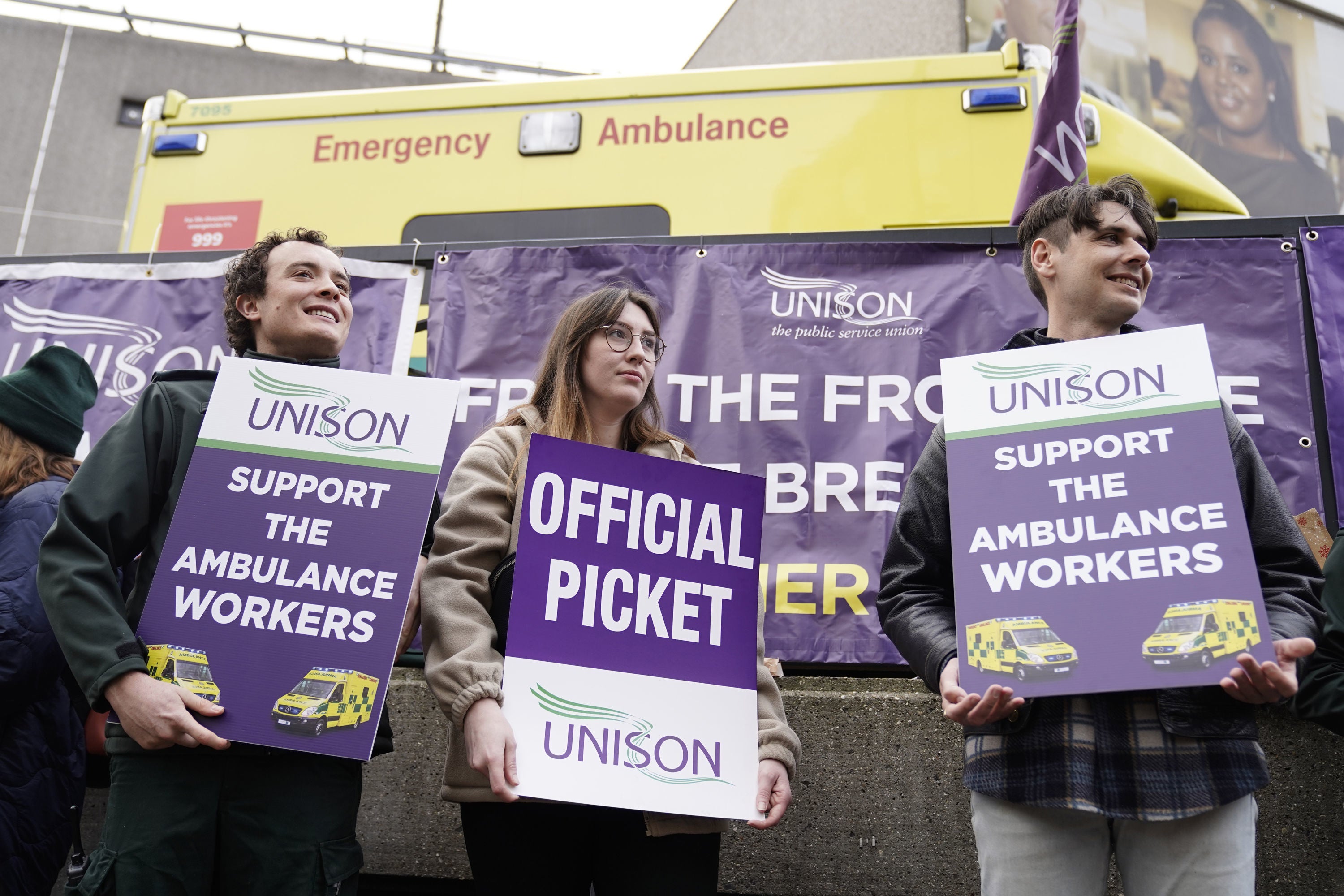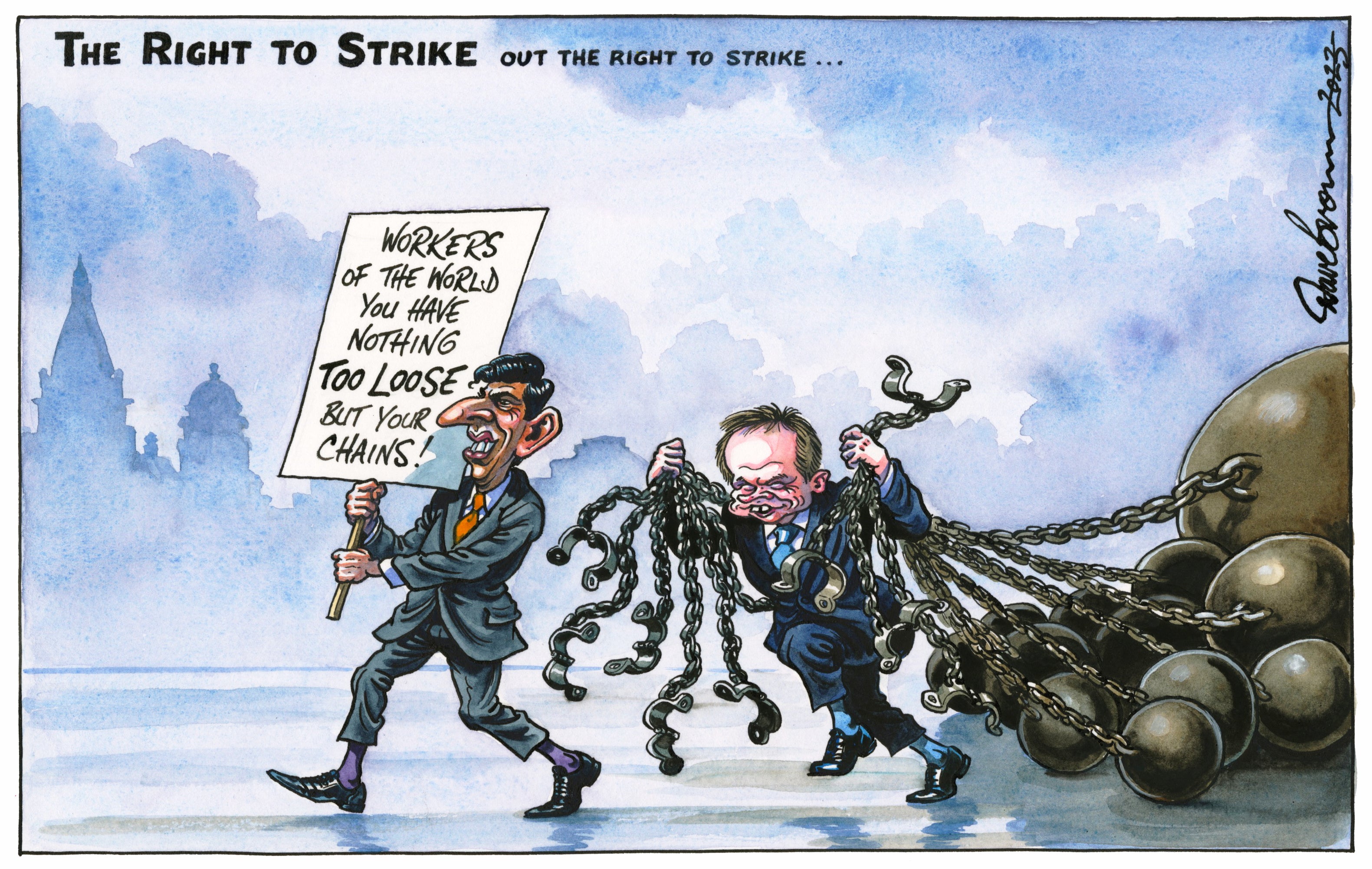
Hello there, I’m Matt Mathers and welcome to The Independent’s Inside Politics newsletter.
Rishi Sunak and Keir Starmer face off at PMQs for the first time this year and ambulance staff walk out again over pay and conditions.
Inside the bubble
Our political commentator Andrew Grice on what to look out for today:
After their battle of the two speeches last week, Rishi Sunak and Keir Starmer will square up at the first prime minister’s questions of the year. Starmer might trail Labour’s line in two opposition day debates to follow. The party will propose a Commons vote on ending the tax breaks enjoyed by private schools and criticise “the government’s mismanagement of the NHS crisis.”
The transport select committee, in a one-off session about the rail strikes, will quiz Mick Lynch, the RMT leader, and bosses from Network Rail and the train operating companies.
Sunak will sign a defence agreement with Fumio Kishida, the Japanese prime minister, during his visit to London. James Cleverly, the foreign secretary, will discuss the Northern Ireland protocol with the province’s political parties in Belfast.
Daily briefing
What is your emergency?
Some 20,000 ambulance staff across England and Wales strike today for the second time over pay and conditions – the latest wave of industrial action to grip the country in what has been deemed another “winter of discontent”.
GMB and Unison, the two unions organising the walkouts, have with health bosses pledged to ensure that all category one emergency calls – the most serious cases – will still get an ambulance during the strikes, which will include 999 call handlers.
Officials have warned that today’s industrial action could be more disruptive than the one that took place before Christmas because the already crippled health service is in an “even more precarious position”.
The extent of the pressure on the NHS – and in particular A&E – is laid bare today in an exclusive report by The Independent’s top health correspondent Rebecca Thomas, who has got hold of leaked data showing the number of patients waiting more than 12 hours in A&E for treatment has exceeded 50,000 a week for the first time.
It would be an understatement to say that the government’s anti-strike bill, introduced to parliament yesterday, did not go down well with unions and campaigners and the opposition. Grant Shapps, the business secretary, was accused of an “outrageous slur” after claiming ambulance workers’ approach to the strikes was “putting lives at risk”.
The legislation from Shapps, who caused a bit of a stir yesterday after posting a bizarre picture to his Twitter with Boris Johnson airbrushed out, has sparked discussion among unions about coordinating strike action alongside a large-scale public show of support for workers in a bid to force the government’s hand on salaries.
Meanwhile, the Labour Party, appears confident that it is on the right side of public opinion with the strikes, particularly with nurses who work long hours breaking their backs to provide care to the sick, and has vowed to fight the legislation and repeal it if it wins the next election.
Steve Barclay, the health secretary, out on the broadcast round earlier, was critical of the way ambulance unions are handling today’s strikes. “It is clearly a concern as to the impact it has on patient safety,” he said.
Asked whether anti-strike legislation would look to prosecute striking workers, Barclay added: “It is about the behaviour much more of the unions than individual members.
“For example, there is a marked difference between what we’ve seen with the RCN (Royal College of Nursing), who put national arrangements in place to guarantee safety, and what we’ve seen with the ambulance strikes, where even up to midnight last night I was getting calls in terms of what arrangements would be in place in terms of the local cover, the minimum safety levels that would be in place, because ambulance unions had refused to do that at a national level.”

Enjoying this newsletter?
Unlock unlimited, ad-free reading on the website and in The Independent app when you subscribe – plus, benefit from our welcome offer when you join today.
Defence deal
Rishi Sunak, the prime minister, will meet with his Japanese counterpart today as the UK and Japan prepare to sign a defence pact, in a move aimed at countering the growing threat posed by China in the Asia-Pacific region.
The deal will allow UK forces to be deployed in Japan and vice versa, in what Downing Street has this morning described as “the most significant defence agreement between the two countries in more than a century”.
Years of negotiation will culminate in the signing of the pact today, which the government says will also cement the UK’s commitment to Indo-Pacific security, allowing both forces to plan and deliver larger scale, more complex military exercises and deployments.
Mr Sunak said: “In this increasingly competitive world, it is more important than ever that democratic societies continue to stand shoulder to shoulder as we navigate the unprecedented global challenges of our time.”
Elsewhere, James Cleverly, the foreign secretary, is to travel to Belfast after a mini-deal struck on Brexit talks raised fresh hopes for the restoration of powersharing. But as ministers try to secure an agreement on two fronts they will warn Northern Irish politicians that voters want “leadership” and them “back at work”.
Today’s cartoon
See all of The Independent’s daily cartoons here

On the record
Angela Rayner, Labour’s deputy leader, says compromising on ideology would be worth it to win power for her party.
“When I was a free school meals kid, principles would not have fed me.”
From the Twitterati
Stephen Bush, Financial Times associate editor, on strike legislation.
“Not clear to me how ‘setting a minimum service standard’ is not, in fact, just *another* way to go into the election talking about the NHS missing key benchmarks.”
Essential reading
- Tom Peck, The Independent: The government’s anti-strike laws announce its own staggering failure
- Daniel Finkelstein, The Times: Tory MPs risk being usurped by their party
- Marina Hyde, The Guardian: It’s Prince Harry in One Flew Over The Windsors’ Nest. Just pity those he left behind
- Julien Binet, The Independent: While evacuating a psychiatric hospital in Ukraine, there was one question on my mind
Inside Politics first appeared in our daily morning email. You can sign up via this link.







